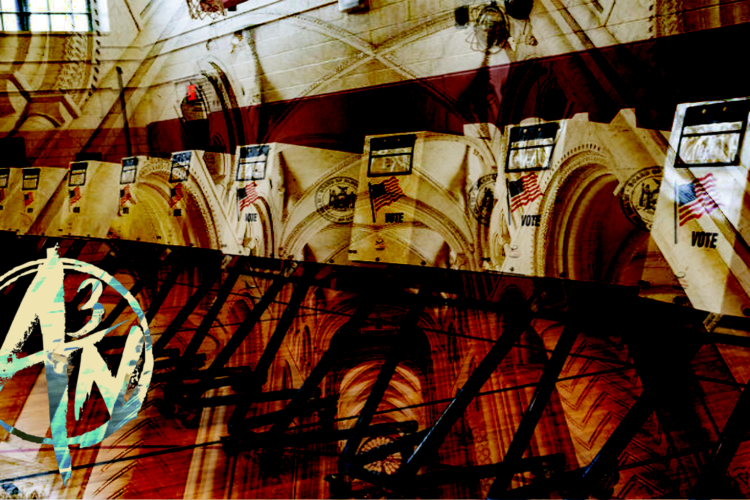
Anarchists Who Vote Are Like Atheists Who Pray
The similarity lies in the inconsistency displayed between stated belief and actions. In reality, however, the consequences of an anarchist who votes are far worse than mere inconsistency. An atheist who sinks to his knees is engaging in a personal act that has no necessary impact on the right of others to remain standing. By contrast, the anarchist who votes is legitimizing a political process that he knows will be used by the State to violate the rights of others. After all the anarchist’s definition of the state is as “institutionalized violence.” Only if he believes the State is not institutionalized violence can the anarchist vote for in good conscience. Upon accepting that belief, of course, he ceases to be an anarchist.
A key question becomes, “In good conscience, how can an ‘electoral anarchist’ facilitate the imposition of unjust power upon unconsenting others – especially, upon non-voters.”
Of course, the State will aggress against everyone who voted for it, against it, or who abstained from casting a ballot. All will said to have consented to the State’s authority, which is merely one indications of how profoundly the electoral game is rigged against the possibility of escape. All who vote are said to render their consent to ‘the system’ by voluntarily participating in it. Even if their candidate was unsuccessful, they rendered a tacit consent to abide by the rules of the game and accept its outcome. Non-voters are also considered bound by electoral results; the common refrain is “you cannot complain if you didn’t participate.”
In his pivotal essay “The Right to Ignore the State”(1851), the classical liberal Herbert Spencer commented, “So, curiously enough, it seems that he [a voter] gave his consent in whatever way he acted – whether he said yes, whether he said no, or whether he remained neuter! A rather awkward doctrine, this. Here stands an unfortunate citizen who is asked if he will pay money for a certain proffered advantage; and whether he employs the only means of expressing his refusal or does not employ it, we are told that he practically agrees, if only the number of others who agree is greater than the number of those who dissent. And thus we are introduced to the novel principle that A’s consent to a thing is not determined by what A says, but by what B may happen to say!”
The preceding process makes a farce of consent by rendering it impossible for anyone to say ‘no’. The farce serves the purpose of the state, not the voters; namely, the State legitimizes itself by being established through the “will of the people.” Whether the electoral anarchist voted ‘for’ or ‘against’ does not diminish his role in sanctioning the result. It is non-voting that weakens the State.
In his essay “If We Quit Voting” (1945), Frank Chodorov put his finger on one of the main problems with casting a ballot: “when we oust the rascals, do we not, as a matter of course, invite a new crowd?” Non-voting reversed that problem. “All this would change if we quit voting. Such abstinence would be tantamount to this notice to politicians: since we as individuals have decided to look after our affairs, your services are no longer needed…. Would chaos result? No, there would be order, without law to disturb it.”
Chodorov concluded, “To effectuate the suggested revolution all that is necessary is to stay away from the polls. Unlike other revolutions, it calls for no organization, no violence, no war fund, no leader to sell it out. In the quiet of his conscience each citizen pledges himself, to himself, not to give moral support to an unmoral institution, and on election day he remains at home. That’s all.”
A specific counter-argument inevitably arises. It runs: as long as you vote to shrink the State, then your vote can be considered an act of self-defense and strategically positive.
I offer merely a few of many possible objections:
A moral objection: Individualist-anarchism – and, indeed, all forms of libertarianism – prohibit the initiation of force against innocent third parties. Voting for a less objectionable politician still sanctions someone’s quest for political office, which is a quest for such unjust power. The anarchist does not object to the State because the wrong hand is at the helm but because the helm is there at all. It is morally wrong to assist anyone into an unjust position of power over the rights and wealth of others.
A psychological objection: Non-voting should be an act of self-respect. Henry David Thoreau wrote in “On Civil Disobedience,” “How does it become a man to behave toward this American government to-day? I answer that he cannot without disgrace be associated with it. … What I have to do is to see, at any rate, that I do not lend myself to the wrong which I condemn.”
A political objection: Shrinking government through political means is a fool’s errand; laws repealed today can be reinstated tomorrow. Moreover, the State’s power does not reside in the number of laws or agencies it creates; it does not depend on its size. Power rests on social conditions such as how many people respect the state’s authority. If a state loses its legitimacy, people will resist taxes and cease to render blind obedience. Freedom demands nothing so much as persuading others that “the Emperor has no clothes.” Voting for the ‘proper’ candidate steps in the wrong direction by increasing the legitimacy of the political process and offices.
A logical objection: It is not possible to know what a politician will do once massive power is his to wield. All predictions that Candidate X will bring more freedom are based on believing campaign promises. The only sure way to achieve political freedom is to eliminate or delegitimize the positions of power being sought.
A practical objection: Voting violates privacy with unfortunate consequences such as being called for jury duty or being trapped in other state databases. Samuel E. Konkin III once wrote, “Counter-economically, [people] are far better off remaining off the State’s books and practicing their respective trades than by stamping themselves as ‘prime sheep’ for the State’s records” and all in order “to get a piece of paper or a pull at the lever to be one of a million or so saying yea or nay to being fleeced.” Rather than voting in self-defense, you should not vote in self-protection.
There is one circumstance under which many of my arguments lose effectiveness. Namely, when an anarchist votes in such a manner as to defile the ballot. Writing “Bozo” into a blank slot is an example. But even then the act of voting relinquishes privacy; merely showing up at the polling station gives the appearance of consent and contributes to the official ‘voter turn-out’. Far better to shout “Bozo!” at televised politicians in the privacy of your own home.







